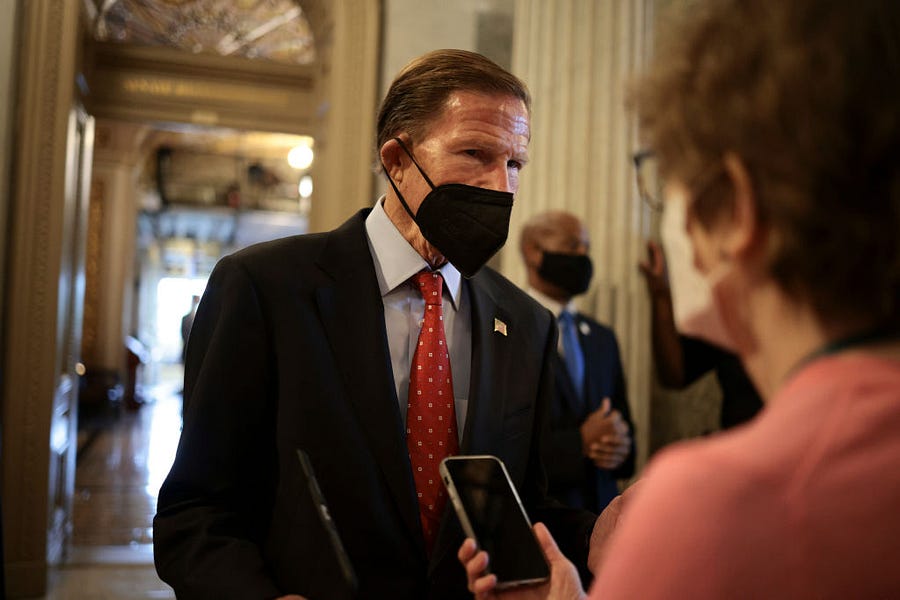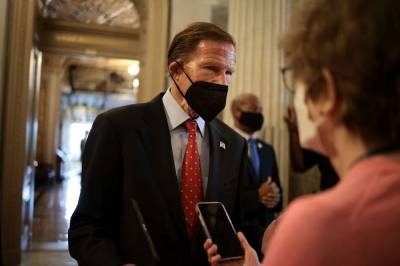For most of the coronavirus pandemic, Democrats have rallied around the phrase “follow the science” as a unifying public mantra while defending the effectiveness of vaccines and masks.
But now that Democratic governors in several states—including New Jersey, California, Delaware, Rhode Island, Oregon, and New York—are lifting mask mandates amid a decline in Omicron cases, liberal lawmakers from those states are at a crossroads. Should they publicly defend their governors’ decisions to lift mandates? Or should they continue to stand by ultra-cautious Centers for Disease Control and Prevention (CDC) guidelines? On both questions, Democratic lawmakers struggle to speak with one voice.
Just ask Democratic Sen. Richard Blumenthal of Connecticut, where indoor masking policies will be left in the hands of local officials beginning February 28, per an executive order from Democratic Gov. Ned Lamont last week. “I think our governor over the last two years has listened to public health experts and followed the medical science, and he seems to be doing so in this instance as well,” Blumenthal told The Dispatch Thursday.
He struggled to reconcile his governor’s executive order with the cautious pandemic strategy of President Joe Biden, who told NBC’s Lester Holt during an interview last week that Democratic governors’ easing of mask mandates is “probably premature” but nevertheless a “tough call” for state executives to make.
When asked about the White House’s hesitation to lift mask mandates, Blumenthal chose his words carefully. “What’s really important is [Biden’s] actions and listening to the scientists and allowing and elevating what the public health experts have to say on these issues, which the president seems to have been doing,” Blumenthal said.
And what do those scientists and health experts have to say? As of today, the CDC—the federal government’s authority for pandemic messaging—still recommends universal masking indoors regardless of vaccination status. “I committed that I would follow the science, the science as put forward by the CDC and the federal people,” Biden told NBC News on Thursday.
Biden’s cautious approach to masking has frustrated Democratic governors, many of whom traveled to the White House last week for a National Governors Association meeting to air their grievances about pandemic messaging with the White House. “What does the road from pandemic to endemic look like, and how do we keep score?” Democratic Gov. Phil Murphy of New Jersey, the vice chairman of the association, told reporters after the meeting. “There was broad agreement that that’s the task before us.” Murphy announced last week that he is lifting the state’s mask mandates in schools.
The last week’s Democrat-led easing of mask mandates across the country coincides with a series of polls showing Americans have accepted that the virus is endemic. A Monmouth University poll released January 31, for example, shows that 70 percent of Americans agree with the statement that “it’s time we accept that Covid is here to stay and we just need to get on with our lives.”
With Democrats’ electoral chances already looking grim ahead of the midterms, liberal lawmakers realize that keeping mask mandates in place risks alienating voters who see the November elections as a referendum on elected officials’ approach to pandemic governing.
This irony is not lost on Republican lawmakers. “The only science that’s changed in the last two weeks is the political science,” Minority Leader Mitch McConnell said on the Senate floor Monday. “The only data that’s changed in the last two weeks is Democrats’ polling data.”
Democratic governors’ effort to overturn mask mandates this week has become a tricky tightrope for Democratic lawmakers to straddle, particularly in the U.S. Senate, where a lawmaker’s face covering status is a key identifier of his or her political affiliation. Even though masks are optional on the Senate side of the U.S. Capitol, passersby are hard-pressed to find a Democratic senator—or reporter, for that matter—not wearing one. Republican senators, on the other hand, only wear them in the Capitol on occasion. (The same norms apply to Senate staffers, many of whom accompany their bosses when they vote on legislation in the Senate chamber.)
Similar dynamics exist on the House side of the Capitol, where face coverings are required in the chamber. Members of the GOP conference are regularly fined for flouting the mandate, and arguments between mask-wearing Democratic members and mask-averse Republicans—who often take them off as soon as they leave the chamber—are common.
It’s unclear how long these norms will last. On Monday, Washington, D.C., Mayor Muriel Bowser announced she will not renew the city’s indoor mask mandate after it expires on February 28, with the exception of some public settings, including schools and government buildings in which government employees interact with the public. The city’s vaccine mandate for some indoor settings will also expire February 15.
Democratic senators are reluctant to pin down an exact timeline as to when they think it’s appropriate for members of their own ranks to ditch masks in the U.S. Capitol. “I don’t think the answer is [that] there’s going to be something magical about February 27 or March 3,” Democratic Sen. Tim Kaine said in a brief interview on Monday. “I think it’s Omicron numbers, particularly in the Capitol region.”
Until that point, Democratic lawmakers will likely continue to evade questions about Biden’s pandemic strategy and how it conflicts with their own Democratic governors’ decisions to lift mandates. “My position on vaccines is it’s my strongest hope—my strongest hope—that everybody who can get vaccinated,” Democratic Sen. Ron Wyden of Oregon told The Dispatch Thursday when asked about Oregon’s indoor mask mandate that expires March 31. “I found this was the kind of approach that brought people together, and that's what I'm trying to do right now.”
Other senators, like Democratic Sen. Dianne Feinstein of California, are struggling to keep up with their own states’ masking policies. “I didn’t know he did,” Feinstein said in an interview on Thursday about California Gov. Gavin Newsom’s decision three days earlier to lift the state’s vaccine mandate beginning February 15. “When is that? When was that?”
“This pandemic has a lot of very serious data of death and illness and I think if you can prevent it, wearing a mask is the least you can do,” Feinstein said, adding that mandate policies should be left up to local officials, as Newsom’s executive order says.
Democratic Sen. Jack Reed of Rhode Island was much more pointed in his defense of Rhode Island Gov. Dan McKee’s decision last week to lift the state’s indoor mask mandate and leave school masking policies up to local officials, particularly since the country is seeing a decline in Omicron cases. “We have to prepare, if there’s another variant to adopt, you know, similar measures, but at this point, it looks as if it’s abating, and it makes sense [to lift the mandate], but we have to be flexible,” Reed said in a brief interview on Monday.
“The president is relying on advice from the CDC,” Reed added. “He’s a national figure not a state figure.”







Please note that we at The Dispatch hold ourselves, our work, and our commenters to a higher standard than other places on the internet. We welcome comments that foster genuine debate or discussion—including comments critical of us or our work—but responses that include ad hominem attacks on fellow Dispatch members or are intended to stoke fear and anger may be moderated.
With your membership, you only have the ability to comment on The Morning Dispatch articles. Consider upgrading to join the conversation everywhere.